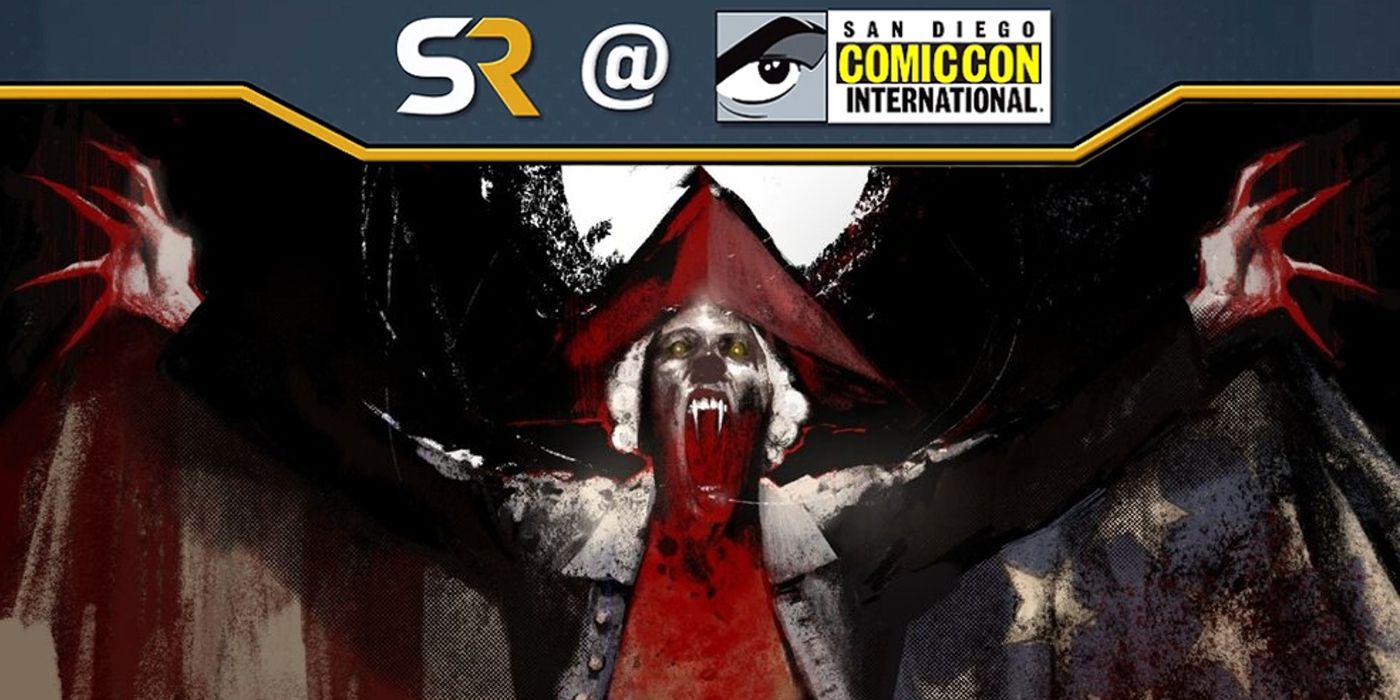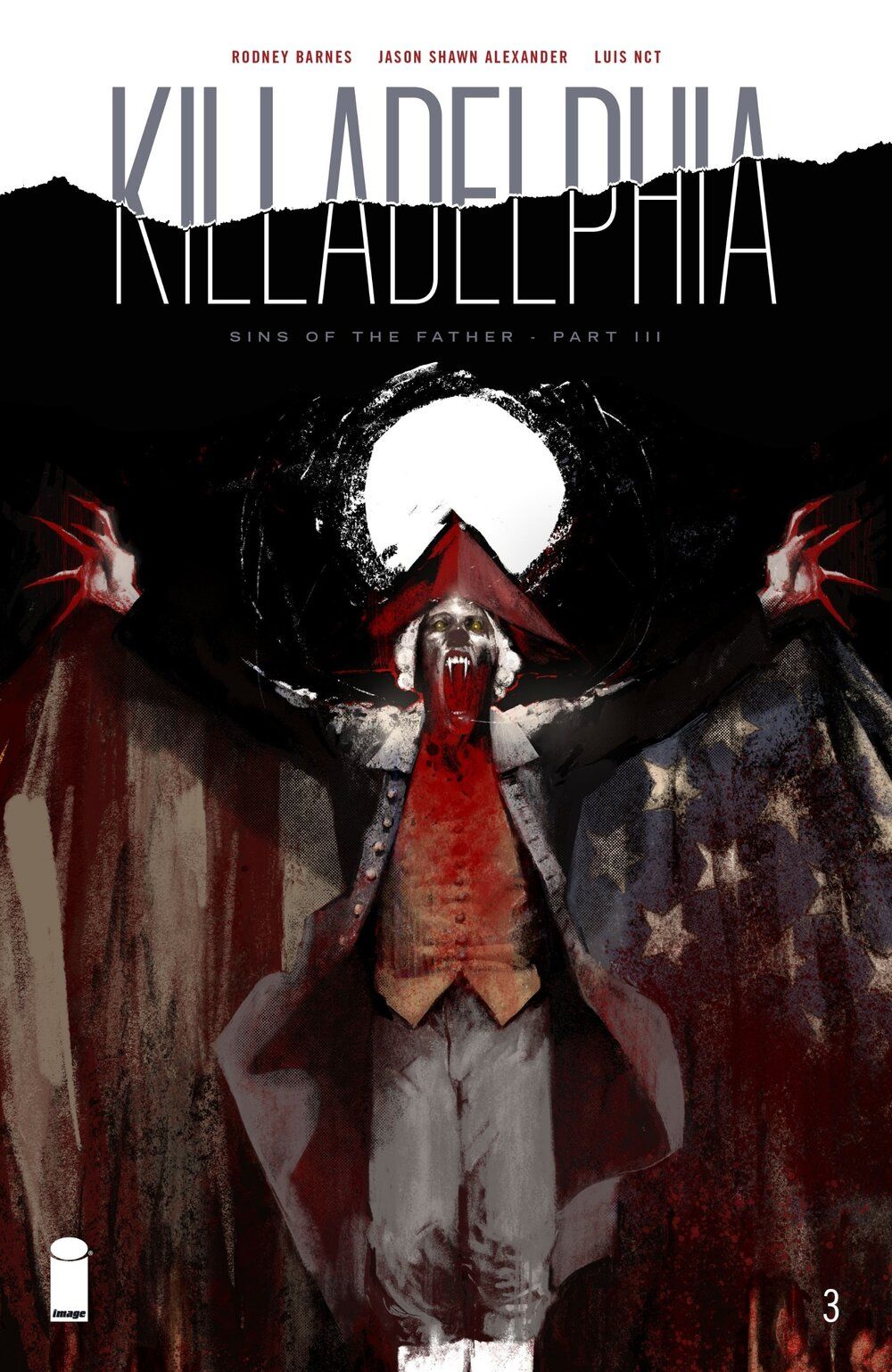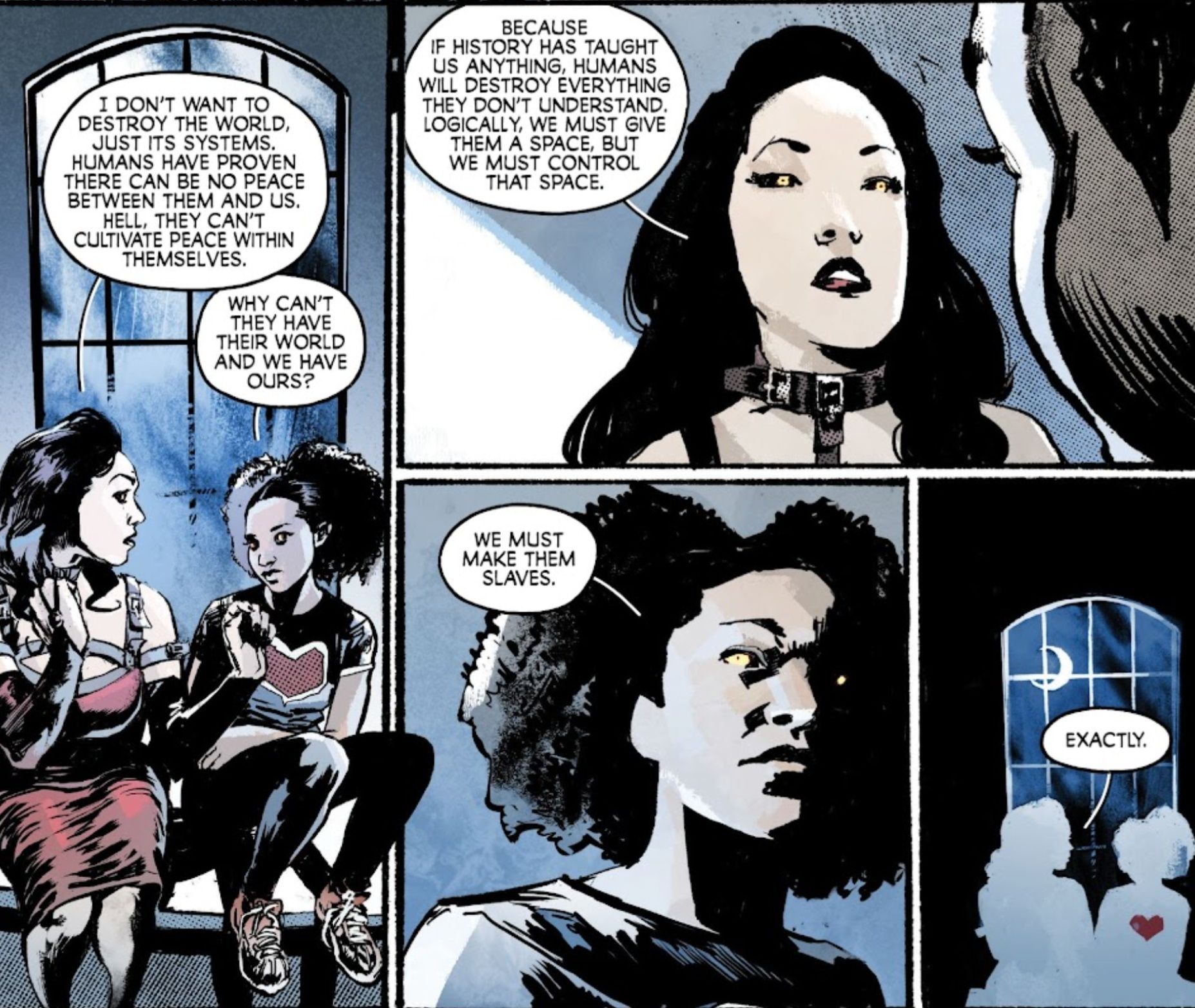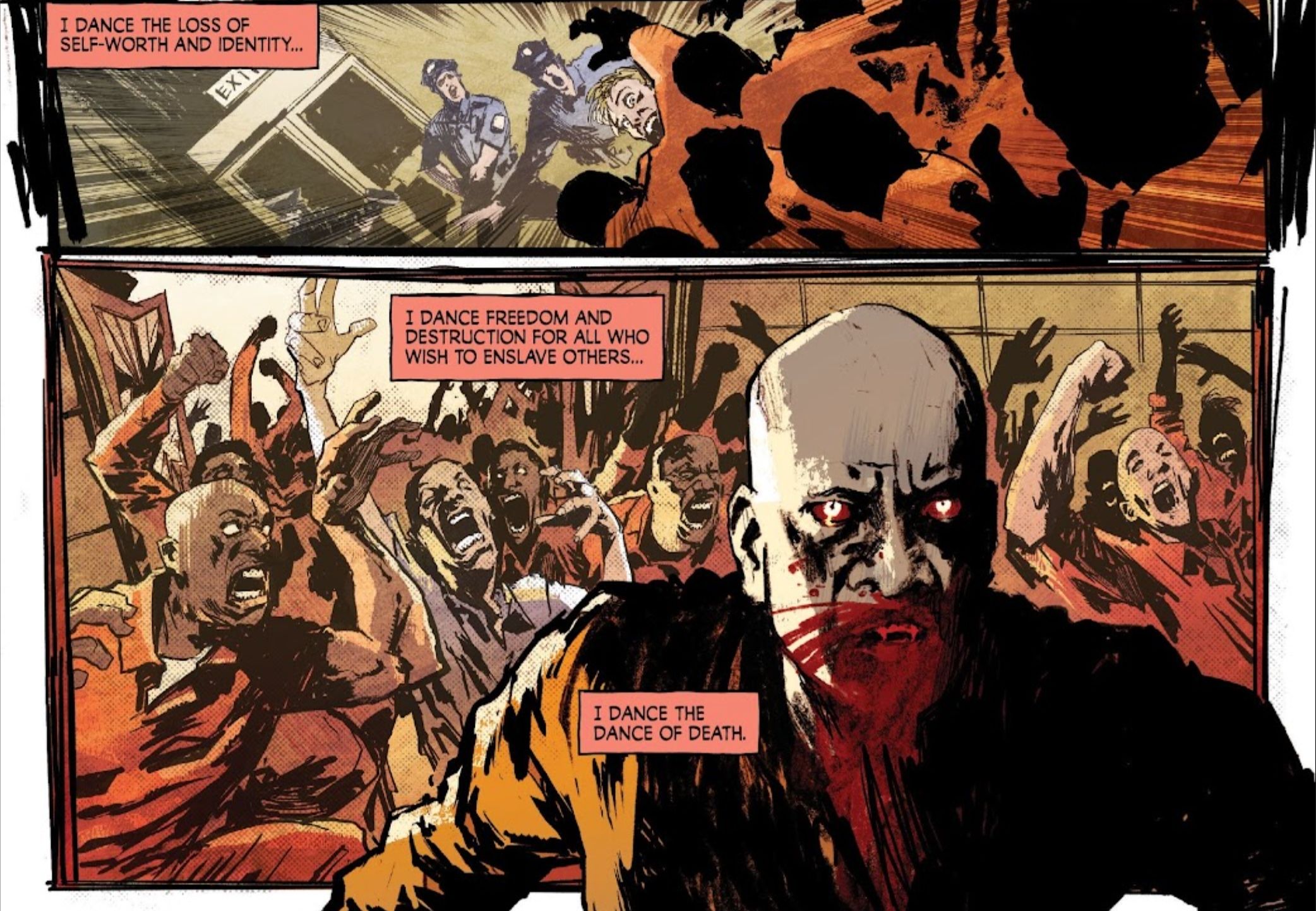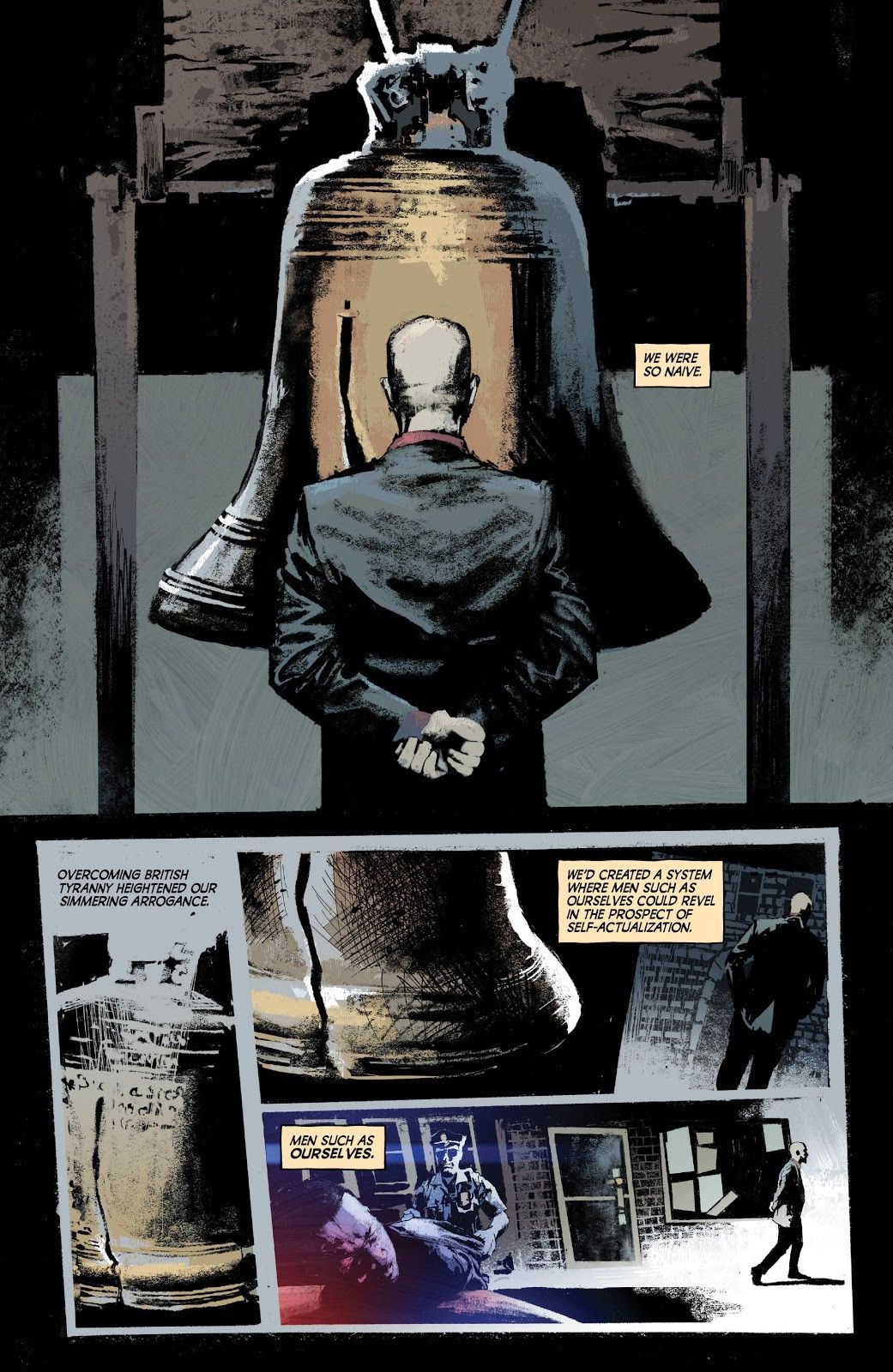Horror comics are at the forefront of many cultural conversations today, and Image Comics' Killadelphia is no exception. Written by Rodney Barnes with art by Jason Shawn Alexander and colors by Luis NCT, Killadelphia blends the vampire and crime genres together in order to tell a deeply personal story about the machinations of power in American history, focusing on the intersections between race, gender, and class. As such, Killadelphia is truly unlike any other vampire story in comics today, its vampirism working as an extended metaphor for the dehumanizing effects of American politics and capitalism.
Killadelphia follows a policeman named Jimmy Sangster who returns to the city when his father, James Sangster, Sr., is murdered. When Jimmy discovers that James Sr. is a vampire, it is only the tip of the iceberg in a larger network of power governing Philadelphia, with Former President John Adams and his wife, Abigail, being at the top of it. Together, Jimmy and his father must reconcile their differences in order to save the city from the vampires' sinister plans, and from humanity's worst impulses. At San Diego Comic-Con, we sat down with Killadelphia writer Rodney Barnes to talk about the genesis behind the series, the balancing act of creating a morally complicated vampire story, and where horror is headed next.
I love your book, Killadelphia, there's just so many parts about it that I just find so enriching. I'm a big fan of monsters in general. But I feel like vampires take on new significance in the story. Where did the idea for Killadelphia come from?
Rodney Barnes: I'll try to make it simple. When I was a kid, I loved the Universal Monsters. I loved the Hammer films. I loved all of that stuff. But I never saw Black people. You know, very rarely, we pop up every once in a while, but never as the main protagonist or the main antagonists. So I said in the back of my mind if I ever became a writer, and I could tell a story, I would put people of color primarily at the center of the narrative. And it evolved over the years. As a kid growing up I loved Kolchak: the Night Stalker, and Richard Matheson. I loved Salem's Lot. I loved the Anne Rice books. And you start as a kid, like formulating what your idea would be.
And then my father passed away, and we always had an estranged relationship. So one day when I was at his grave site, I asked myself, "If we had more time, would our relationship get better?" And it was like, well, it's not necessarily an issue of time, because a lot of people have time. It's really the intent of the two people trying to make a relationship work. So I said, "Well, what if-" because I have this macabre imagination, "-he was a vampire, he could come back, and we had to work together. How would that work?" And would we work out our problems if we were forced to be together in a situation? So the "A" story between James Sangster and his son Jimmy, is primarily that story. It's my father, it's me, it's my son, and trying to figure out peace between people who love each other, but it's a lot more messy than just that because of the backstory and all of that stuff.
The John Adams story came about when I was looking for an antagonist that was complicated. I've seen the play Hamilton at least 20 times. So it kept hitting me when they make fun of John Adams, spoiler alert. If John Adams was in the audience, how would that make him feel? Because you see these primary and secondary characters from the Founding Fathers presented, but no real voice of John Adams, except this joke. "Ah, John Adams." And so I stick him in. When I studied John Adams, I saw that he had a lot of progressive points of view for the day. He didn't own slaves. He's more liberal when it came to women's issues, and a few other things. So I'm like, "Okay, what if he looked at today's world, today's America, and saw more of an oligarchy, where the wealthy and 1% are relishing in this period of becoming billionaires and such, and you have this 99% that are at odds with each other. If he had the power to give those people in the 99% perspective in immortality, then the layer of desperation that I think people fight from, and where the fear, I think, is beneath a lot of the discourse, if we could eliminate that, we could take over the world." So that's where that part came from.
In Seesaw, the other main character, I wanted a voice of Philadelphia, a voice of a common guy, this knock-around guy that's just trying to make it in the world. So it's not just these elevated ideas. There's an idea that's here, as well, as a person who didn't enter this from a place of passion, but really a place of apathy, where I think a lot of American society is right now where people just feel disconnected. He felt disconnected and now he's given this injection of immortality and perspective. "Now, what do I do with it?" Because immortality in and of itself sort of takes the idea of purpose away, because you have another baton. And the whole thing too was I always felt like the idea of vampires just being after blood was sort of leaving a lot on the table. Or making them sexy, and karate and different things, which are all great. But it's like, what if you can add this thing into it that took the social dynamics in play in society and integrated into such a way that you didn't remove the genre, you can still have vampires being vampires, and it's still a natural predator, a threat to human beings. But you have this other layer there, that doesn't feel like okay, we have to stop the story in order to give you a lesson now about society or race or culture or women's issues or whatever. So that's Killadelphia in a nutshell.
That's a great overview of the whole series. What you were getting at with taking vampires and putting social commentary at the front, but also keeping the genre very complicated, it brought to mind for me one of the most striking aspects about the book, which is their complexities as monsters, specifically through Abigail Adams' character. I know from history classes I took, her and John Adams had a very close relationship. I remember my teacher saying, "The man may be the head, but the woman is the neck." And I remember this moment in Killadelphia where she basically is saying, "You can't trust humans, because they're just going to kill what they don't understand." And I was like, "I'm with you, I agree." But then, a second later, she advocates for slavery.
Rodney Barnes: With Abigail, there's an aspect of marriage, I think, that is patriarchal, because it comes from Christianity–no judgments against Christianity–but it does have this dynamic where men are here, and women are here. And so, "Till death do us part. What happens if we have immortality at play? Do I have to stay in this construct, if I'm never going to die?" And Abigail, again, had a lot to do with creating this great political family of her sons, the kids, and really helping John along the way. And I'm like, "Okay, if I have this talent, but I live in a world where I'm suppressed because of what I am, and I have to give it to everybody else, what type of frustration must that build in me, that I never get to self actualize?"
So I was like, if you give Abigail this idea of power, and "I know what to do in this situation, but I'm following John, because I'm used to following John. Now that John is gone, I get to do it my way. In my way, it lacks a degree of sentiment, because I'm further removed from humanity. So I can approach this from a completely different mindset than John does. John still is connected, because he's connected to the ego idea of being President of the United States, and ruling human beings in a very specific way. I don't have that same identity issue. So I can just come in, and hopefully do things better."
I love that. She's such a complicated character.
Rodney Barnes: She is. And her relationship with Sally Hemings, I hope to be able to build on that a little bit more, too.
Absolutely. And so with vampires and with the genre, because there's also a very big crime element to the book, are there any specific aspects about either genre that you wanted to avoid with the story?
Rodney Barnes: I didn't want to do the traditional garlic, cross, the tropes of what usually stops the vampire. What I wanted to do was key into more of human beings, to lesser or greater degrees, the flaws that we carry, a lot of them were made in childhood, and trauma. And I wanted them to be these beings that were immortal, and had all of this other stuff. But they were still haunted by the ghosts of the stuff that had happened to them, and the habits that I think as human beings we bring into adulthood from childhood. So I wanted to focus more on that, and I also wanted to give, when they're in the coffin, that to mean something. So if you could disconnect, like if your body is a prisoner of sorts for your soul, but your hibernation state your body is in because it needs blood and blah, blah, blah, why can't your soul move about and go places?
So that's when I introduced in issue eight, I believe, going to the River Styx and James going to see his wife, and you can go to Heaven and Hell, and Seesaw does that. I just felt like the original idea, even though they were great, the Bela Lugosi, Christopher Lee, those guys, it was so simple, that in today's world, there was so much more that you could do with this idea, that I wanted to play more with that and the idea of fully formed beings, rather than just these predators who manipulate in the name of acquiring blood.
I think specifically, with the childhood element, for Jupiter, that whole arc through history, I think, is really so impactful. And just in terms of, "What does childhood mean if you're immortal," and if time just keeps going on, but you stay the same age, how do the same problems impact you over time?
Rodney Barnes: Thank you. Yes. With Jupiter particularly and I think with the character Brittany, who sort of is a play on my actual daughter, who isn't sure she likes being a vampire. But in Interview with the Vampire, there's the character, Claudia. And she also was a child, and she wrestles with the idea of being an immortal child. There was something about that that I felt like if I could attach slavery to it, and "The only thing I know about my childhood is never being nurtured and never been cared for," to me, it was like another level of making a character who could be angry, but also there's a confusion that's mixed with that anger. She still calls Abigail, "Mommy Abigail," even though there's roughly 30 years' difference as far as when one was born, and the other one was born. And they're both hundreds of years old. But that idea of mother-daughter and needing nurture to be there is important.
And back to Jupiter, you know, who was a real character from American history. When I was reading about Jupiter, and he gave the little bit of money that he had to Thomas Jefferson to help him through college, to get his books and things, and still, Thomas did the things to him that he did to him. I go back to anger and frustration, and all of those things where you're confused, like, "What is friendship? And can a friendship exist within a power dynamic where I'm a slave, and you're a master." And all of that stuff was always really, really interesting to me about history, because we learn about history in school, or at least I did, in a very one dimensional, "This was a president, this is what he did." There's sort of a propaganda element that only shoots one idea of what this person did, and none of us are perfect. You know, if you judge me on my worst days, who knows what you'll think, but hopefully I have more good days than I do bad days.
Here, you have a system in place where there was slavery, there was the subjugation of women. And probably another thing that walked with this great idea of America, and freedom and democracy and all of this other stuff. And I think, not teaching that and not dealing with that part of it is part of the problem that we wrestle with right now as a society, because we don't see it objectively. And we see it as, "This period of time was pristine, because we have this document. And we need to stay true to this." Well, there were problems then. And that's why they built an amendment so that we could continue to evolve and become a better society. But that idea seems to have been forgotten. And I've just always thought that the best horror, for me, was horror that dealt with real stuff. And every generation, the George Romero Night of the Living Dead, Dawn of the Dead, capitalism, race, all of this other stuff, that if I could touch upon a lot of the things that we're dealing with right now through the lens of genre, then maybe something good could come of it.
There was this very transactional relationship between Jupiter and Thomas Jefferson, literally, which just is absolutely heartbreaking. Returning back to America as a whole, a striking thing that comes to me is, at a certain point in the story, you realize, there are the people who are literally vampires in the story and those that are human, but in general, it seems like America is the greatest vampire of them all. It's also born from blood. And so I was curious as to what the dynamics were behind that?
I think that there's this weird thing when it comes to power and human beings, when order to maintain it, you sort of have to subjugate other groups, and keep them in check so that they don't rise up and take power from you. And when we would look at all of the dynasties over time. They've all sort of fallen, but they made sure that they kept everybody else in check, which means you have to hurt people to a lesser, greater degree. And I don't know if that's natural. Then there's this other side that says, "If you share power, at some point, you will be dominant." Which part is right? And should you judge either side?
And for me, the whole vampire idea as a stronger version of humanity, that just works in a completely different way, it takes all of the layers off, and you're stripped down to just the truth of who you are and what you are. And the predatory aspect of who you are reigns supreme, there is no place for sentiment, there's no place for really love, but you still feel all of these things underneath, which makes it complicated. And that's where in the future arcs I want to be able to explore that kind of stuff. Because, you know, I think it's funny, when people would read issue one, they think, "Oh, it's gonna be a crime vampire thing." And then by, you know, arc number three, you've got Jupiter talking to Jesus, and talking to the gods and all this stuff.
I don't look at it so much as color, as it is culture. And I think everybody has a different way of doing things. So we're all human beings. And that cultural take on it lends itself to telling the story from a different place. You've seen this way, and this way is fantastic. What if there's another way to tell a similar type of story? And when you look at guys like Jordan Peele and people of color within LGBTQ and all these other groups that haven't really been a part of the party, it's not so much that it's a different story, as much as it is you're not used to people from different points of view, approaching the same place. They don't necessarily walk in the woods when they hear a noise. They say different things, and they approach it from a different place. And I wanted to do the same thing in a different type of way.
To close, what's the most rewarding part about doing this book for you?
Rodney Barnes: Having these conversations. I mean, being able to create a place. I write Star Wars books as well. And you see the community that the Star Wars world is, and it's one thing to be able to have discourse and debate and all of that about subject matter. It's another thing to be able to create a world that encompasses the conversation. And you're able to bring people to the conversation, and talk about it in a way that doesn't feel adversarial. I never take a side in Killadelphia. I never say, "This side is bad, this side is good." I just tried to present both sides. So it's not like a left, right, it's none of that. I try to come from, "This is how this character feels." I won't say it's a lot like the Sith and the Jedi, but it is a thing of where from both points of view, there's some place where there's a logic that's there, that fuels that individual to think what they're doing is "the right thing." And I try to present it to where the flaws become the evil thing, the flawed aspect of all of them. And so someone said something to me once at a convention where, "I never know where this book is gonna go." And that's the biggest compliment. Because I try to make sure that it's never so plot driven, that I have to do a "thing." I have to conclude an arc every six issues. But I never want to have to conclude it in such a way that I'm doing it just to get you to come back because of the plot. I want you to come back because you care about the people. So that's Killadelphia.
Killadelphia #25 will be released by Image Comics on November 30th, 2022.

